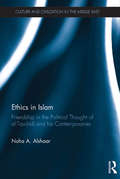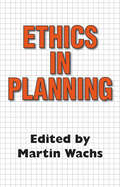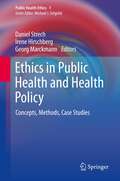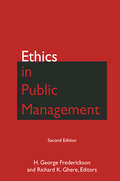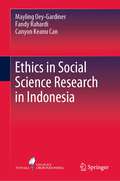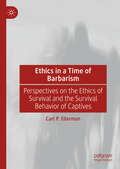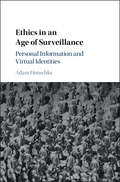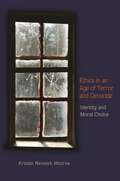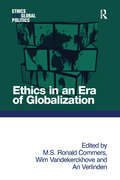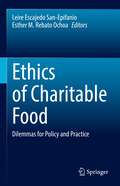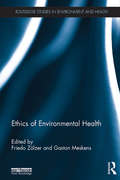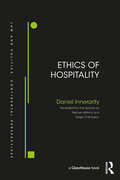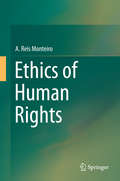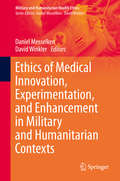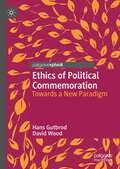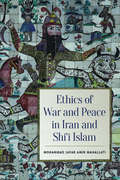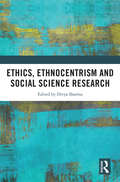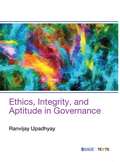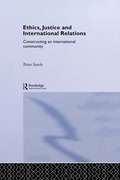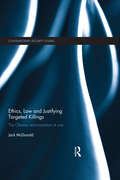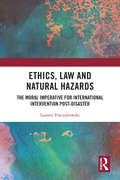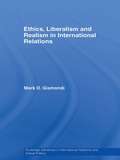- Table View
- List View
Ethics in Islam: Friendship in the Political Thought of Al-Tawhidi and his Contemporaries (Culture and Civilization in the Middle East)
by Nuha Al-ShaarOffering a new reading of Islamic ethical and political thought in the Būyid period (334-440/946-1048), this book focuses particularly on the philosopher Abū Hayyān al-Tawhīdī who lived in Baghdad and what is now western Iran. Ethics in Islam provides the first major treatment of al-Tawhīdī's ethics, political thought, and social idealism, investigating the complex influences that shaped this thought and especially his concept of friendship, which is analysed in the unique context of Būyid society. Al-Tawhīdī revives the value of friendship in politics. He introduces it as the best way to reform social and political order and as a means to the good life, to restrain passion and self-interest, to bring about cooperation and promote reason, and for action in opposition to religious zeal. Instead of seeing him as alienated from society, supposedly rejecting traditional Muslim beliefs, this book places him in his historical and intellectual contexts, and shows that while he was original in many ways, his outlook was firmly rooted in the Islamic culture in which he was educated. Contributing to modern discussions of Islam and political ethics, this book is of interest to scholars and researchers of political philosophy, comparative ethical thought and Islamic studies.
Ethics in Planning
by Martin WachsSome planners limit discussions of ethics to simple, though important, questions about the propriety of their daily activities. This approach to ethics restricts discussion of professional ethics to the propriety of everyday social and professional relationships. It ignores the broader ethical content of planning practice, methods, and policies. While narrow definitions of ethical behavior can easily preoccupy public officials and professional associations, they divert attention from more profound moral issues.Martin Wachs argues that ethical issues are implicit in nearly all planning decisions. For illustrative and educational reasons, it is useful to divide ethics in planning into four distinct categories. The first category includes the moral implications of bureaucratic practices and rules of behavior regarding clients and supervisors. The second category includes ethical judgments which planners make in exercising their "administrative discretion." More complex, and represented by a third category, are the moral implications of methods and the ethical content of criteria built into planning techniques and models. The final type represents the basic choices which society makes - those inherent in the consideration of major policy alternatives.Ethics in Planning contains a variety of representative papers to capture the current state of thinking. This book will be important as a text for survey classes in professional ethics given by university planning programs. It should also supplement short courses in planning ethics for practicing professionals and provide source materials for discussions of planning ethics sponsored by local chapters of the American Planning Association and similar organizations. It gathers together exemplary and critical works, thus it will also interest individual planners in a field that only continues to grow in recognition and importance.
Ethics in Politics: Then and Now
by Jebamalai VinanchiarachiThe evolution of economic thought could be traced to the writings of Plato and Aristotle who treated Economics as part of Ethics and Politics centuries ago, calling it political economy. Those two masters of ancient economic thought are our contemporaries as their thoughts are indispensable to modern economic analysis of emerging issues and options. Today, we talk a great deal about ethics in business practice. The approach has its ancestors in previous centuries. The way political factors play a key role in economic policy pronouncements bear testimony to the convictions its ancestors had when they called Economics as Political Economy. It is in the context of the changed perceptions of old thoughts, I furnish my reflections on Politics without Ethics. Adam Smith, the Father of Economics, should not have separated Economics from Politics and Ethics, with a view to giving an independent status to the social science Economics. Perhaps, had Economics remained as Political Economy governed by ethical norms, politicians would not have treated Politics as an effective means to become rich.
Ethics in Public Health and Health Policy: Concepts, Methods, Case Studies
by Irene Hirschberg Daniel Strech Georg MarckmannEthical issues associated with public health and health policy--related, for example, to pandemic plans and vaccination policies (c.f. SARS or pandemic influenza), preventive measures like screening (e.g. for breast cancer or dementia) or health information campaigns, social inequalities or health care rationing--are increasing in worldwide importance. Evidence-based information for valid benefit-harm assessment is often rare and hard to get for participants in public health interventions. Program implementation often disregards requirements of fair decision-making processes (like public participation, transparency, etc.). Originating from an international conference (based on a call for abstracts and external review), this volume contains contributions from a group of experts from multiple disciplines and countries. It covers (i) conceptual foundations of public health ethics, (ii) methodological approaches and (iii) normative analyses of specific issues and cases. Bridging theoretical foundations with practical applications, this volume provides a valuable resource for researchers, practitioners and students concerned with public health practice and policy.
Ethics in Public Management
by H George Frederickson Richard K GhereThe first edition of this work, published in 1993, refuted the notion that administrative ethics could not be studied empirically. In this second edition, Frederickson (public administration, University of Kansas) and Ghere (political science, University of Dayton) expand their scope to include both the managerial and individual/moral dimensions of ethical behavior, and add a new section on administrative ethics and globalization. Other sections cover organizational designs that support ethical behavior, market forces that compromise administrative ethics, and unintended outcomes of anticorruption reforms. The book is appropriate for a graduate course in public sector ethics.
Ethics in Social Science Research in Indonesia
by Mayling Oey-Gardiner Fandy Rahardi Canyon Keanu CanThis textbook presents ethical guidelines for conducting research in the social sciences, focused on Indonesia. As a country with a fast-growing research environment, the real-life cases of ethical issues that arise in Indonesia can teach both aspiring and established researchers how to approach the complexity of research ethics and dilemmas. With technological advancement affecting how research is conducted, the necessary ethical guidelines for research are also evolving. The instantaneous nature of information movement has made confidentiality in research data more critical than before, and any negligence in protecting research participants has an unprecedented scope of damage. The methods book synthesises hundreds of worldwide ethical guidelines and past issues that social science researchers will find highly relevant. Arranged chronologically to represent each research stage—from research preparation to post-research—the book prepares researchers to mitigate ethical crises. Relevant to all social scientists, both emerging and established, conducting research in Indonesia, this co-published textbook between Springer and OBOR is also relevant to researchers beyond the archipelago. It is also an indispensable teaching resource for lecturers in research methods and ethics across social science disciplines.
Ethics in a Time of Barbarism: Perspectives on the Ethics of Survival and the Survival Behavior of Captives
by Carl P. EllermanDuring a time of widespread intraspecific aggression and barbaric captivity throughout the planet, this study of the ethics of survival asks the burning question: At the extremes of experience, when captives are struggling to survive, is there a line at which the moral judgment of survival behavior ceases? Stated differently: Are there times in the lives of humans when the valiant attempt to maintain moral scruples clashes with the way the world is—moments when moral pretension, moral aspiration, and the expectation of moral agency are absurd? Putting the burning question under strain, Carl P. Ellerman offers testimony from the confessional publications of survivors who were subjected to life-threatening barbaric experiences. He also critically scrutinizes the competing ethical perspectives of Hume, Kant, Nietzsche, and the U.S. Department of Defense Military Code of Conduct to show how the ethics of survival has been handled philosophically and militarily. Empirical evidence from Evolutionary Biology, Primatology, and the Neurosciences is interwoven to advance a biological realism in the ethics of survival. Readers are also invited to undertake an honest self-examination, using active imagination to answer unsparing questions, as if each reader were wearing the shoes of a captive who abjures the fictions of an ideal self.
Ethics in an Age of Surveillance: Personal Information and Virtual Identities
by Adam HenschkePeople increasingly live online, sharing publicly what might have once seemed private, but at the same time are enraged by extremes of government surveillance and the corresponding invasion into our private lives. In this enlightening work, Adam Henschke re-examines privacy and property in the age of surveillance in order to understand not only the importance of these social conventions, but also their moral relevance. By analyzing identity and information, and presenting a case for a relation between the two, he explains the moral importance of virtual identities and offers an ethically robust solution to design surveillance technologies. This book should be read by anyone interested in surveillance technology, new information technology more generally, and social concepts like privacy and property.
Ethics in an Age of Terror and Genocide: Identity and Moral Choice
by Kristen Renwick MonroeThe significance of identity and psychology in determining moral choiceWhat causes genocide? Why do some stand by, doing nothing, while others risk their lives to help the persecuted? Ethics in an Age of Terror and Genocide analyzes riveting interviews with bystanders, Nazi supporters, and rescuers of Jews during the Holocaust to lay bare critical psychological forces operating during genocide. Monroe's insightful examination of these moving—and disturbing—interviews underscores the significance of identity for moral choice.Monroe finds that self-image and identity—especially the sense of self in relation to others—determine and delineate our choice options, not just morally but cognitively. She introduces the concept of moral salience to explain how we establish a critical psychological relationship with others, classifying individuals in need as "people just like us" or reducing them to strangers perceived as different, threatening, or even beyond the boundaries of our concern. Monroe explicates the psychological dehumanization that is a prerequisite for genocide and uses her knowledge of human behavior during the Holocaust to develop a broader theory of moral choice, one applicable to other forms of ethnic, religious, racial, and sectarian prejudice, aggression, and violence. Her book fills a long-standing void in ethics and suggests that identity is more fundamental than reasoning in our treatment of others.
Ethics in an Era of Globalization (Ethics and Global Politics)
by M. S. CommersThis much-needed volume represents all that is new in the field of global ethics. It recognizes the emergence of the search to move beyond relativism and the study of ethical aspects of globalization, acknowledging aspects of globalization that make ethical reasoning itself a challenging task. As such the young field of global ethics is a search for new approaches and methodologies that go beyond existing ones and succeed in addressing these ethical issues of globalization. This volume presents these new developments, focusing specifically on how to re-conceive ethics in order to come to grips with ethical and political life today. It sets out an agenda for the field of global ethics, addresses the critiques and illustrates the rapprochement of global ethics. This is a valuable collection of essays that connect theoretical innovation with substantive issues in the public realm and hence is suitable for a wide audience across philosophy, politics, international relations and development studies.
Ethics of Charitable Food: Dilemmas for Policy and Practice
by Leire Escajedo San-Epifanio Esther M. Rebato OchoaThis book provides an in-depth analysis of different dimensions of contemporary food charity. It does so against the background of an increasing number of food banks and other forms of food philanthropy. The book examines the incongruity of considering food donation as an expression of 'pure altruism'. Taking into account the dignity and rights of people, it addresses how hunger is seen and explained in rich countries and how philanthropy and democracy coexist. It looks at the relationship that exists between religious traditions and the current food donation narrative. It discusses the risks of stigmatizing food recipients, and clarifies ways to better deal with food poverty and food waste. Paradoxically, food insecurity and food waste have grown exponentially in the last decade. More and more people are not able to access food properly. The amount of perfectly edible food that is discarded also grows. The consolidation of democracies, welfare policies, and economic growth do not guarantee that all citizens can meet their basic needs in the so-called rich countries. This book analyses the current state of affairs and presents facts and reflections from diverse sources and from a cross-disciplinary perspective.
Ethics of Citizenship: Immigration and Group Rights in Germany
by William A. Barbieri Jr.Who is to be included in a political community and on what terms? William A. Barbieri Jr. seeks answers to these questions in this exploration of the controversial concept of citizenship rights--a concept directly related to the nature of democracy, equality, and cultural identity. Through an examination of the case of Germany's settled "guestworkers" and their families, Ethics of Citizenship investigates the pressing problem of political membership in a world marked by increased migration, rising nationalist sentiment, and the ongoing reorganization of states through both peaceful and violent means. Although some of Germany's foreign workers have gradually attained a degree of social and economic legitimacy, Barbieri explains how they remain effectively excluded from true German citizenship. Describing how this exclusion has occurred and assessing current attitudes toward political membership in Germany, he argues for a just and democratic policy toward the tax-paying, migrant worker minority, one that would combine the extension of the individual rights of citizenship with the establishment of certain group rights. Through a dissection of ongoing public "membership debates" over issues such as suffrage, dual citizenship, and immigration and refugee policy, Barbieri identifies a range of competing responses to the question of who "belongs" in Germany. After critiquing these views, he proposes an alternative ethic of membership rooted in an account of domination and human rights that seeks to balance individual and group rights within the context of a commitment to democracy and equal citizenship. Indispensable for scholars of German studies, Ethics of Citizenship also raises questions that will attract moral philosophers, constitutional scholars, and those interested in the continuing, global problems associated with migration.
Ethics of Environmental Health (Routledge Studies in Environment and Health)
by Friedo Zölzer Gaston MeskensEnvironmental health encompasses the assessment and control of those environmental factors that can potentially affect human health, such as radiation, toxic chemicals and other hazardous agents. It is often assumed that the assessment part is just a matter of scientific research, and the control part a matter of implementing standards which unambiguously follow from that research. But it is less commonly understood that environmental health also requires addressing questions of an ethical nature. How can we determine the "acceptable" risk level for the general population or for certain groups? How should we deal with uneven distributions of risks and benefits? How do we communicate about risks with the stakeholders? This multidisciplinary collection brings together a number of leading researchers and scholars in order to generate discussion surrounding these key questions, and to bring the ethical implications of science and technology to the forefront of critical thought. Providing a broad overview of the Ethics of Environmental Health, its philosophical foundations and practical applications, this book offers a significant contribution to ongoing discussions in sustainable development and will be of interest to scholars and practitioners of Environmental Health, urban studies and healthcare.
Ethics of Global Development
by David A. CrockerPoverty, inequality, violence, environmental degradation, and tyranny continue to afflict the world. Ethics of Global Development offers a moral reflection on the ends and means of local, national, and global efforts to overcome these five scourges. After emphasizing the role of ethics in development studies, policymaking, and practice, David A. Crocker analyzes and evaluates Amartya Sen's philosophy of development in relation to alternative ethical outlooks. He argues that Sen's recent turn to robust ideals of human agency and democracy improves on both Sen's earlier emphasis on 'capabilities and functionings' and Martha Nussbaum's version of the capability orientation. This agency-focused capability approach is then extended and strengthened by applying it to the challenges of consumerism and hunger, the development responsibilities of affluent individuals and nations, and the dilemmas of globalization. Throughout the book the author argues for the importance of more inclusive and deliberative democratic institutions.
Ethics of Hospitality (Law and Politics)
by Daniel InnerarityThe source of hospitality lies in the fundamental ethical experiences that make up the fabric of the social lives of people. Therein lies a primary form of humanity. Whether we are guests or hosts, this reveals our situation in a world made up of receiving and meeting, leaving room for the liberty to give and receive beyond the imperatives of reciprocity. This book proposes an ethic that promotes the possibility of stirring emotion before that of protecting ourselves from unexpected encounters. Fundamental ethical competence consists of opening up to the wholly other and to others, to be accessible to the world’s solicitations. There is moral superiority of vulnerable love over control and moderation, of generous passion over rational prudence and of excess over exchange. Constructing an ethic of hospitality is essential at a time when we are torn between the imperatives of modernization and growth and the demands of concern and protection. The experience we all have today, that of the fragility of the world, is giving rise to a powerful tendency toward solicitude. From such a perspective, the duty of individuals no longer consists of protecting themselves from society, but of defending it, taking care of a social fabric outside of which no identity can be formed.
Ethics of Human Rights
by A. Reis MonteiroThis volume focuses on the ethical significance of human rights, aiming at contributing to a universal culture of human rights with deep roots and wide horizons. Its purpose, scope and rationale are reflected in the three-part structure of the manuscript. Part I has a broad introductory historical, theoretical and legal character. Part II submits that an Ethics of Human Rights is best understood as an Ethics of Recognition of human worth, dignity and rights. Moreover, it is argued that human worth consists in the perfectibility of the human species, rooted in its semiotic nature, to be accomplished through the perfecting of human beings, for which the right to education is key. In Part III, the main legal and political outcomes of the Human Rights Revolution are described and answers to the most lasting and common criticisms of human rights are provided. To conclude, the human stature of the Big Five drafters of the Universal Declaration of Human Rights is profiled and the priority that should be recognized to human rights education is highlighted. Some appendices supplement the manuscript. While making a case for the high value and liberating power of the idea and ideal of human rights, objections, controversies and uncertainties are not at all overlooked and emerging issues are explored. The diversity of content of this volume meets many needs of the typical syllabus for a human rights course.
Ethics of Medical Innovation, Experimentation, and Enhancement in Military and Humanitarian Contexts (Military and Humanitarian Health Ethics)
by Daniel Messelken David WinklerThis book discusses ethical questions surrounding research and innovation in military and humanitarian contexts. It focuses on human enhancement in the military. Recently, the availability of medical enhancement designed to make soldiers more capable of surviving during conflict, as well as enabling them to defeat their enemies, has emerged. Innovation and medical research in military and humanitarian contexts may thus yield positive effects, but simultaneously leads to a number of highly problematic ethical issues. The work contains contributions on medical ethics that take into account the specific roles and obligations of military and humanitarian health care providers and the ethical problems they encounter. They cover different aspects of research and innovation such as vaccine development, medical enhancement, compassionate and experimental drug use, research and application of new technologies such as wearables, “Humanitarian innovation” to cope with scarce resources, Biometrics, big data, etc.The book is of interest and importance to researchers and policy makers involved with human enhancement, medical research, and innovation in military and humanitarian missions.
Ethics of Political Commemoration: Towards a New Paradigm (Twenty-first Century Perspectives on War, Peace, and Human Conflict)
by David Wood Hans GutbrodThis book proposes a new Ethics of Political Commemoration adapted from the Just War tradition, reflecting that remembrance is often conducted with political – and even coercive – intent. With its Ius ad Memoriam (what to commemorate) and Ius in Memoria (how to commemorate) criteria, the framework looks to guide debates that are currently inchoate so that remembrance of the past can transform relationships in the present and build a shared future. Offering a moral argument with memorable illustrations, Gutbrod and Wood draw on experiences from Armenia, Georgia, Ireland, Lebanon, and Libya, while connecting to mainstream debates in Western Europe and the United States. Bringing together an ethical tradition with the practice of conflict transformation, the framework fuses two perspectives that enrich each other. The book, in providing a first systematic presentation of the ethics, seeks to engage citizens and scholars, and help those who work to transform conflicts.
Ethics of War and Peace in Iran and Shi'i Islam
by Mohammed Jafar MahallatiNearly four decades after a revolution, experiencing one of the longest wars in contemporary history, facing political and ideological threats by regional radicals such as ISIS and the Taliban, and having succeeded in negotiations with six world powers over her nuclear program, Iran appears as an experienced Muslim country seeking to build bridges with its Sunni neighbours as well as with the West.Ethics of War and Peace in Iran and Shi'i Islam explores the wide spectrum of theoretical approaches and practical attitudes concerning the justifications, causes and conduct of war in Iranian-Shi'i culture. By examining primary and secondary sources, and investigating longer lasting factors and questions over circumstantial ones, Mohammed Jafar Amir Mahallati seeks to understand modern Iranian responses to war and peace. His work is the first in its field to look into the ethics of war and peace in Iran and Shi'i Islam. It provides a prism through which the binary source of the Iranian national and religious identity informs Iranian response to modernity. By doing so, the author reveals that a syncretic and civilization-conscious soul in modern Iran is re-emerging.
Ethics, Ethnocentrism and Social Science Research
by Divya SharmaThis book addresses the ethical and methodological issues that researchers face while conducting cross-cultural social research. With globalization and advanced means of communication and transportation, many researchers conduct research in cross-cultural, multicultural, and transnational settings. Through a range of case studies, and drawing on a range of disciplinary expertise, this book addresses the ethics, errors, and ethnocentrism of conducting law and crime related research in settings where power differences, as well as stereotypes, may come into play. Including chapters from scholars across cultures and settings – including Greece, Canada, Vienna, South Africa, India, and the United States – this book provides an invaluable survey of the issues attending cross-cultural social justice research today. Engaging issues confronted by all cross-cultural researchers this book will be invaluable to those working across the social sciences as well as professionals in criminal justice and social work.
Ethics, Integrity, and Aptitude in Governance
by Ranvijay UpadhyayThis textbook methodically helps students to assimilate, articulate, and expand their knowledge and understanding of ethics, accountability, and integrity in public governance and service. The text is supported by illustrations, highlights of recent research and studies, and examples created out of the participant - observant experiences of the author as a public servant. In order to supplement the explanations and discussions, Ethics, Integrity and Aptitude in Governance closely follows a 'consilience' approach to topics wherein facts are intricately linked to the theories across relevant disciplines. This approach will help students to trace the evolution of concepts such as ethics, good governance and others, and assess their application in the real world. The book will prove to be an indispensable companion for students and practitioners of public administration in developing a holistic understanding of the challenges of public service in democratic nations like India. It is supported by illustrations, highlights of recent research and studies, and examples created out of the participant - observant experiences of the author as a public servant. Key Features: Integrated with a comprehensive coverage of both theoretical aspects and real-world applications of ethical practices in governance Logically sequenced into seven sections that discuss ethics and human values, ethics and public service, probity in governance, challenges of effective governance, corporate governance, ethical issues in international relations and public funding, and emotional intelligence and aptitude. Includes Chapter-end review exercise for practice and book-end case studies with answer cues to demonstrate how case studies should be studied and interpreted
Ethics, Justice and International Relations: Constructing an International Community (Routledge Advances in International Relations and Global Politics #13)
by Peter SutchThis topical and timely book critically explores contemporary liberal international relations theory. In the fifty years since the declaration of human rights, the language of international relations has come to incorporate the language of justice and injustice. The book argues that if justice is to become the governing principle of international politics, then liberals must recognise that their political preferences cannot be the preconditions of global ethics. The hierarchy of international political ethics must be constructed afresh so that the first principles of justice are accessible to all agents as political and ethical equals.This book will be essential reading for students and scholars in politics, international relations, political theory and ethics.
Ethics, Law and Justifying Targeted Killings: The Obama Administration at War (Contemporary Security Studies)
by Jack McDonaldThis book examines the normative debates around the American use of targeted killings. It questions whether the Obama administration’s defence of its use of targeted killings is cohesive or hypocritical. In doing so, the book departs from the disciplinary purpose of international law, constitutional law and the just war tradition and instead examines discipline-specific defences of targeted killings to identify their requisite normative principles in order to compare these norms across disciplines. The methodology used in this book means that it argues that targeted killings are only defensible as acts of war, but it also highlights the normative role of accountability and responsibility in this defence. In doing so, it offers an argument that the use of ‘pattern of life’ killings by the CIA falls outside the defence offered by the Obama administration, but that this same type of targeting could be used by the military due to differing standards/mechanisms of responsibility assignment in these organisations. The book thus provides a way of investigating contemporary wars where the conduct of war lacks the traditional hallmarks of conventional warfare. Furthermore, by drawing attention to differing normative concepts that underpin competing interpretations of law and morality, it provides a way of analysing contemporary political violence in an interdisciplinary fashion without seeking to displace single disciplinary study. This book will be of much interest to students of military studies, ethics of war, foreign policy, international security and IR.
Ethics, Law and Natural Hazards: The Moral Imperative for International Intervention Post-Disaster
by Lauren TraczykowskiThis book argues that the international community has a moral duty to intervene on behalf of a population affected by a natural hazard when their government is either unable or unwilling to provide basic, life-saving assistance. The work draws on law, international relations theory, and political philosophy to articulate that non-response to a natural hazard is unethical. In providing policy suggestions the author articulates what should happen based on an ethical analysis. Readers will thus gain an ethical lens with which to view intervention in the aftermath of a natural hazard. The book encourages readers to consider the nuances of arguments from various disciplines about whether or not intervention is appropriate. Whilst arguing throughout that an intervention policy in response to natural hazards should be developed by the international community, the study also accounts for why intervention should only be used in very limited situations. This interdisciplinary approach makes the book essential reading for researchers, academics and policy-makers working in the areas of international law, humanitarian studies, human rights, international relations and political science.
Ethics, Liberalism and Realism in International Relations (Routledge Advances in International Relations and Global Politics #Vol. 61)
by Mark D. GismondiThis book explores the complex issue of international ethics in the two dominant schools of thought in international relations; Liberalism and Realism. Both theories suffer from an inability to integrate the ethical and pragmatic dimensions of foreign policy. Liberal policy makers often suffer from moral blindness and a tendency toward coercion in the international arena, whilst realists tend to be epistemic sceptics, incorporating Nietzsche’s thought, directly or indirectly, into their theories. Mark Gismondi seeks to resolve the issues in these two approaches by adopting a covenant based approach, as described by Daniel Elazar’s work on the covenant tradition in politics, to international relations theory. The covenant approach has three essential principles: policy makers must have a sense of realism about the existence of evil and its political consequences power must be shared and limited liberty requires a basis in shared values. Ethics, Realism and Liberalism in International Relations will be of interest to students and researchers of politics, philosophy, ethics and international relations.
